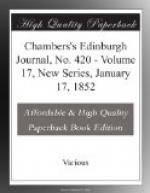see, though our hero is described as a man of placid
demeanour and somewhat Quakerly appearance, he could
be not a little fiery at times—he sat down
and wrote to the commanding officer, entreating leave
to sleep at an inn, and proffering the deposit of
all his money as a pledge for his reappearance next
morning. The reply was an order that he should
surrender his writing materials. At seven o’clock,
the appointed sleeping hour, the sergeant returned
and gave the signal for bed by rapping with his cane
on the floor, which was speedily covered by a number
of dirty bags of mouldy straw—the regulation
mattresses, it would seem, for involuntary recruits.
Jackson—peppery again—refused
to lie down, but was at last compelled to do so, and
between two of the dirtiest fellows of the lot, each
of whom had a leg chained to an arm. The next
morning, at his own request, he was brought before
the commandant of the town, who had only arrived late
the preceding evening, and whom he found seated in
his bedroom, ’with all his officers standing
round him receiving orders,’ says Jackson, ’with
more humility than orderly-sergeants.’
The commandant repeated the offer of ’cavalry
or infantry;’ adding that a war was about to
commence with the Turks, and that good-behaviour would
insure promotion. However, finding Jackson obstinately
persistent in his refusal, he quietly observed, in
conclusion, that the emperor, as a matter of rule and
of right, ‘impressed’ into his army all
such as entered his dominions without certificates
of character. ‘The order was so tyrannical,’
declares our
detenu, ’that I could not
contain myself. “Put me in chains, if you
please,” I said, “but I tell you, all Germany
shall not make me carry a musket for the emperor."’
This impetuous burst of indignation seems to have
alarmed the phlegmatic commandant, who accordingly
let our adventurer go, counselling him, however, to
write to the English ambassador at Vienna for a passport,
lest he should get into further trouble.
Jackson passed through the Tyrol into Italy, everywhere
indulging his love of scenery and still greater love
of adventure; studying with all the acuteness of his
countrymen the varied characters of the people he
met with, and in his correspondence with home friends,
sketching them in language striking for its force,
its propriety, and originality. Some of his remarks
on men and manners are conceived in a truly Goldsmithian
vein, whilst all testify at once to the goodness of
his heart and the quickness of his perceptions.
At Venice he says that he felt it to be ’such
a feast of enjoyment as seldom falls to the lot of
man, and never to the lot of any but a poor man, who
has nothing conspicuous about him to attract the notice
of the crowd,’ to possess such facilities as
he did for learning what the people of foreign countries
really were.




